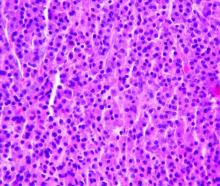In patients with multiple myeloma who had already undergone multiple lines of therapy, the combination of ibrutinib and carfilzomib with or without dexamethasone produced a favorable rate of response and progression-free survival.
Ibrutinib and carfilzomib combination therapy was also associated with manageable safety in the phase 1 results of the ongoing study, investigators wrote in the journal Leukemia & Lymphoma.
“This combination resulted in promising and durable responses,” Ajai Chari, MD, of the Tisch Cancer Institute at Mount Sinai Hospital, New York, and coauthors wrote.The reported overall response rate in the study was 67%. Median progression-free survival was 7.2 months, which was “encouraging considering the poor outcomes often observed in this group,” Dr. Chari and colleagues wrote.
Carfilzomib, a selective and irreversible proteasome inhibitor, is indicated for patients with previously treated multiple myeloma. Ibrutinib, an orally administered covalent inhibitor of Bruton tyrosine kinase, already has Food and Drug Administration approval for treatment of several B-cell malignancies. Bruton tyrosine kinase is expressed in more than 85% of myeloma tumor cells, according to the researchers, and its signaling may contribute to development of drug resistance.
In an earlier phase 2 study, ibrutinib plus dexamethasone produced a 28% clinical benefit rate and median progression-free survival of 4.6 months. Preclinical data suggest combining ibrutinib and carfilzomib may have a synergistic effect, according to researchers.
To test that hypothesis, Dr. Chari and colleagues conducted a phase 1 dose-finding study including 43 myeloma patients who had previously received at least two lines of therapy, including bortezomib and an immunomodulatory agent. Among those patients, about three-quarters were refractory to bortezomib and one-quarter had high-risk cytogenetics.


